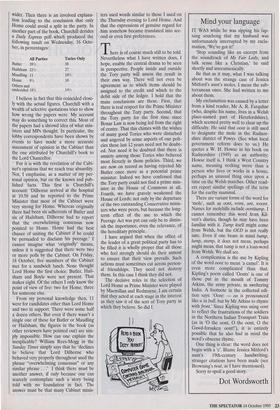Mind your language
IT WAS while he was sipping his lap- sang souchong that my husband was unfortunately interrupted by my excla- mation, `We've got it!'
`Stop sounding like an excerpt from the soundtrack of My Fair Lady, and talk sense like a Christian,' he said shortly and unecumenically.
Be that as it may, what I was talking about was the strange case of Jessica Mitford's aunt's moles. I mean the sub- terranean ones. She had written to me about them.
My exclamation was caused by a letter from a kind reader, Mr A. R. Farquhar (who, despite his name, lives in a Welsh place-named part of Herefordshire), which seemed pretty well to clear up the difficulty. He said that oont is still used to designate the mole in the Radnor- shire district of Powys. (See what local government reform does to us.) He quotes a W. H. Howse in his book on Radnorshire (1949) as an authority; Howse itself is, I think a West Country name, meaning nothing more than a person who lives or works in a house, perhaps an unusual thing once upon a time on the Welsh marches. Other read- ers report similar spellings of the term for the earthy mammal.
There are variant forms of the word for `mole', such as oont, wont, unt, woont. Names for molehills include oontitump. I cannot remember this word from Kil- vert's diaries, though he may have been familiar with it. Tump itself might come from Welsh, but the OED is not really sure. Even if one bears in mind bump, lump, stump, it does not mean, perhaps might mean, that tump is not a loan-word from Welsh. We shall see.
A complication is the use by Kipling of the word oont to mean 'a camel'. It is even more complicated than that. Kipling's poem called 'Oonts' is one of those put in the mouth of Tommy Atkins, the army private, in sweltering India. A footnote in the collected edi- tion says: `Oont: — oo is pronounced like u in bull, but by Mr Atkins to rhyme with front.' Since Kipling was using oont to reflect the frustrations of the soldiers in the Northern Indian Transport Train (as in '0 the oont, 0 the oont, 0 the Gawd-forsaken oont!'), it is entirely possible that he also had in mind the word's obscene rhyme.
One thing is clear: the word does not begin with a 'c'. Blame Jessica Mitford's aunt's 19th-century handwriting; stranger citations have been made (see Browning's twat, as I have mentioned). Sorry to spoil a good story.
Dot Wordsworth










































































 Previous page
Previous page